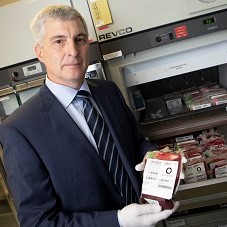 "By improving oxygen transport to the brain during the acute phase of care, it may be possible to save more nerve cells in the days following a traumatic brain injury, preventing secondary brain damage," - Dr. Dean FergussonIncreased use of blood transfusions after major traumatic brain injury could help people hospitalized in intensive care units regain greater functional independence and a better quality of life, according to a clinical trial published in the New England Journal of Medicine co-led by Drs. Dean Fergusson, Alexis Turgeon and François Lauzier.
"By improving oxygen transport to the brain during the acute phase of care, it may be possible to save more nerve cells in the days following a traumatic brain injury, preventing secondary brain damage," - Dr. Dean FergussonIncreased use of blood transfusions after major traumatic brain injury could help people hospitalized in intensive care units regain greater functional independence and a better quality of life, according to a clinical trial published in the New England Journal of Medicine co-led by Drs. Dean Fergusson, Alexis Turgeon and François Lauzier.
The trial compared two transfusion strategies - restrictive and liberal, that differed in terms of the minimum hemoglobin concentration in a patients' blood before giving a blood transfusion. Most patients hospitalized after a traumatic brain injury suffer from anemia, which could reduce oxygen transport to the brain at a time when it’s most vulnerable.
"By improving oxygen transport to the brain during the acute phase of care, it may be possible to save more nerve cells in the days following a traumatic brain injury, preventing secondary brain damage," said Dr. Fergusson.
The combined incidence of death and major disability was not statistically significantly different between the two groups, but favoured the liberal approach, along with major secondary outcomes such as quality of life and function.
The international study recruited 724 critically ill patients in 34 hospital centres in Canada, the United Kingdom, France and Brazil.
Kindergarten teacher Casey Delaney was one of the Ottawa-area patients in this study.
See press release from Université Laval for more.
Authors: Alexis F. Turgeon, Dean A. Fergusson, Lucy Clayton, Marie-Pier Patton, Xavier Neveu, Timothy S. Walsh, Annemarie Docherty, Luiz M. Malbouisson, Sébastien Pili-Floury, Shane W. English, Ryan Zarychanski, Lynne Moore, Paule Lessard Bonaventure, Vincent Laroche, Michael Verret, Damon C. Scales, Neill K. J. Adhikari, Jonathan Greenbaum, Andreas Kramer, Vanesa Garnelo Rey, Ian Ball, Kosar Khwaja, Matt Wise, Daniel Harvey, François Lamontagne, Russell Chabanne, Almunder Algird, Stephan Krueper, Julien Pottecher, Frederick Zeiler, Jonathan Rhodes, Andrea Rigamonti, Karen E. A. Burns, John Marshall, Donald E. Griesdale, Laís Silva Sisconetto, Demetrios J. Kutsogiannis, Claire Roger, Robert Green, J. Gordon Boyd, Judith Wright, Emmanuel Charbonney, Priya Nair, Timothy Astles, Eric Sy, Paul C. Hébert, Michael Chassé, Alwyn Gomez, Tim Ramsay, Monica Taljaard, Alison Fox-Robichaud, Alan Tinmouth, Maude St-Onge, Olivier Costerousse, and François Lauzier, for the HEMOTION Trial Investigators on behalf of the Canadian Critical Care Trials Group, the Canadian Perioperative Anesthesia Clinical Trials Group, and the Canadian Traumatic Brain Injury Research Consortium.
Core resources: Ottawa Methods Centre
Funding: This trial was funded by the Canadian Institutes of Health Research and the Canadian Accelerating Clinical Trials (ACT) Consortium.
The Ottawa Hospital is a leading academic health, research and learning hospital proudly affiliated with the University of Ottawa and supported by The Ottawa Hospital Foundation.
